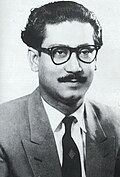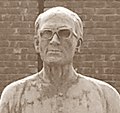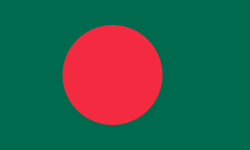| No. | Portrait | Officeholder
(birth–death)
Constituency | Term of office | Designation | Ministry | Prime Minister/
Chief Adviser |
|---|
| From | To | Tenure |
|---|
| 1 | |  | Abul Hasnat Muhammad Qamaruzzaman
(1926–1975)
MP for Rajshahi | 10 April
1971 | 11 January
1972 | 276 days | Minister | Mujib I | | Tajuddin Ahmad |
|---|
| 2 | |  | Sheikh Mujibur Rahman
(1920–1975)
MP for Gopalganj-3 | 11 January
1972 | 12 April
1972 | 92 days | Minister | Mujib II | Sheikh Mujibur Rahman |
|---|
| 3 | | | Abdul Mannan
(1929–2005)
MP for Dhaka | 12 April
1972 | 16 January
1973 | 279 days | Minister |
|---|
| 4 | | | Abdul Malek Ukil
(1924–1987)
MP for Noakhali | 16 January
1973 | 1 February
1974 | 1 year, 16 days | Minister | Mujib III |
|---|
| 5 | |  | Muhammad Mansur Ali
(1919–1975)
MP for Sirajganj | 1 February
1974 | 15 August
1975 | 1 year, 195 days | Prime Minister | Mujib IV | | Muhammad Mansur Ali |
|---|
| 6 | |  | Khondaker Mostaq Ahmad
(1918–1996) | 15 August
1975 | 7 November
1975 | 84 days | Minister | Mostaq | | Vacant |
|---|
| 7 | |  | Ziaur Rahman
(1936–1981) | 7 November
1975 | 21 April
1977 | 2 years, 241 days | CMLA & Minister | Sayem | | Mashiur Rahman
(Acting) |
|---|
21 April
1977 | 6 July
1978 | Zia | Shah Azizur Rahman |
| 8 | |  | A S M Mustafizur Rahman
(1934–1996)
MP for Khulna-2 | 6 July
1978 | 27 November
1981 | 3 years, 144 days | Minister |
|---|
| 9 | |  | M. A. Matin
(1932–2012)
MP for Pabna-5 | 27 November
1981 | 24 March
1982 | 117 days | Minister | Sattar |
|---|
| 10 | |  | Hussain Muhammad Ershad
(1930–2019) | 24 March
1982 | 17 July
1982 | 115 days | CMLA & Minister | Ershad | | Vacant |
|---|
| 11 | |  | Mohabbat Jan Chowdhury
MP for Faridpur-3 | 17 July
1982 | 19 July
1983 | 1 year, 2 days | Minister |
|---|
| 12 | |  | Abdul Mannan Siddique
(?–2000) | 19 July
1983 | 17 February
1986 | 2 years, 213 days | Minister | Ataur Rahman Khan |
|---|
| 13 | |  | Mahmudul Hasan
(1936–2025) | 17 February
1986 | 1 December
1986 | 287 days | Minister | Mizanur Rahman Chowdhury |
|---|
| 14 | |  | M. A. Matin
(1932–2012)
MP for Pabna-5 | 1 December
1986 | 21 March
1989 | 2 years, 110 days | Minister |
|---|
| 15 | |  | Mahmudul Hasan
(1936–2025) | 21 March
1989 | 6 December
1990 | 1 year, 260 days | Minister | Moudud Ahmed |
|---|
| 16 | |  | Khaleda Zia
(1945–2025)
MP for Bogra-6 | 7 April
1991 | 19 September
1991 | 165 days | Prime Minister | Khaleda I | | Khaleda Zia |
|---|
| 17 | |  | Abdul Matin Chowdhury
(1944–2012)
MP for Narayanganj-1 | 19 September
1991 | 19 March
1996 | 4 years, 182 days | Minister |
|---|
| 18 | |  | Khandaker Mosharraf Hossain
(b. 1946)
MP for Comilla-2 | 19 March
1996 | 30 March
1996 | 11 days | Minister | Khaleda II |
|---|
| 19 | |  | Muhammad Habibur Rahman
(1928–2010) | 30 March
1996 | 24 June
1996 | 86 days | Chief Adviser | Habibur | | Muhammad Habibur Rahman |
|---|
| 20 | |  | Rafiqul Islam
(b. 1943)
MP for Chandpur-5 | 24 June
1996 | 2 March
1999 | 2 years, 251 days | Minister | Hasina I | | Sheikh Hasina |
|---|
| 21 | |  | Mohammed Nasim
(1948–2020)
MP for Sirajganj-2 | 2 March
1999 | 16 July
2001 | 2 years, 136 days | Minister |
|---|
| 22 | |  | Latifur Rahman
(1939–2012) | 16 July
2001 | 11 October
2001 | 87 days | Chief Adviser | Latifur | | Latifur Rahman |
|---|
| 23 | |  | Altaf Hossain Chowdhury
(b. 1947)
MP for Patuakhali-1 | 11 October
2001 | 26 March
2004 | 2 years, 167 days | Minister | Khaleda III | | Khaleda Zia |
|---|
| 24 | |  | Iajuddin Ahmed
(1931–2012) | 29 October
2006 | 11 January
2007 | 74 days | President &
Chief Adviser | Iajuddin | | Iajuddin Ahmed |
|---|
| 25 | |  | M. A. Matin
(born 1943) | 16 January
2008 | 6 January
2009 | 356 days | Adviser | Fakhruddin | Fakhruddin Ahmed |
|---|
| 26 | |  | Sahara Khatun
(1943 – 2020)
MP for Dhaka-18 | 7 January
2009 | 17 September
2012 | 3 years, 254 days | Minister | Hasina II | | Sheikh Hasina |
|---|
| 27 | |  | Muhiuddin Khan Alamgir
(b. 1942)
MP for Chandpur-1 | 18 September
2012 | 21 November
2013 | 1 year, 64 days | Minister |
|---|
| 28 | |  | Sheikh Hasina
(b. 1947)
MP for Gopalganj-3 | 21 November
2013 | 14 July
2015 | 1 year, 235 days | Prime Minister | Hasina III |
|---|
| 29 | |  | Asaduzzaman Khan
(b. 1950)
MP for Dhaka-12 | 15 July
2015 | 6 August
2024 | 9 years, 22 days | Minister | Hasina III |
|---|
| Hasina IV |
| Hasina V |
| 30 | |  | M. Sakhawat Hossain
(b. 1948) | 9 August
2024 | 16 August
2024 | 7 days | Adviser | Yunus | | Muhammad Yunus |
|---|
| 31 | |  | Jahangir Alam Chowdhury
(b. 1953) | 16 August
2024 | Incumbent | 1 year, 147 days | Adviser |
|---|























![lu[?]phujjaamaan baabr (6 aagstt 2005).jpeg](http://upload.wikimedia.org/wikipedia/commons/thumb/0/01/%E0%A6%B2%E0%A7%81%E0%A7%8E%E0%A6%AB%E0%A7%81%E0%A6%9C%E0%A7%8D%E0%A6%9C%E0%A6%BE%E0%A6%AE%E0%A6%BE%E0%A6%A8_%E0%A6%AC%E0%A6%BE%E0%A6%AC%E0%A6%B0_%28%E0%A7%AC_%E0%A6%86%E0%A6%97%E0%A6%B8%E0%A7%8D%E0%A6%9F_%E0%A7%A8%E0%A7%A6%E0%A7%A6%E0%A7%AB%29.jpeg/120px-%E0%A6%B2%E0%A7%81%E0%A7%8E%E0%A6%AB%E0%A7%81%E0%A6%9C%E0%A7%8D%E0%A6%9C%E0%A6%BE%E0%A6%AE%E0%A6%BE%E0%A6%A8_%E0%A6%AC%E0%A6%BE%E0%A6%AC%E0%A6%B0_%28%E0%A7%AC_%E0%A6%86%E0%A6%97%E0%A6%B8%E0%A7%8D%E0%A6%9F_%E0%A7%A8%E0%A7%A6%E0%A7%A6%E0%A7%AB%29.jpeg)


